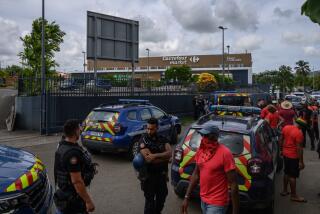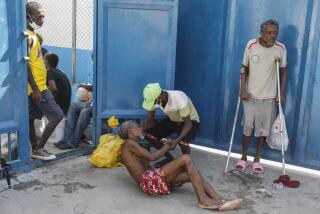Botha Imposes Nationwide Emergency; U.S. Protests : Hundreds Seized in Roundup
JOHANNESBURG, South Africa — South Africa declared an unprecedented nationwide state of emergency today and seized hundreds of anti-apartheid activists in predawn raids that some said would lead to a blood bath.
The crackdown, which began at midnight but was not announced until 12 hours later, was designed to combat a possible explosion of violence Monday on the 10th anniversary of the Soweto township riots that left nearly 600 dead.
President P. W. Botha, who spoke to a hushed Parliament in Cape Town late in the afternoon, said he realized the declaration could lead to “punitive measures” from other nations.
“I wish to say forthrightly to the outside world . . . we will . . . not allow our heritage of more than 300 years to be placed needlessly on the altar of chaos and decay,” he said.
1,600 Killed Since ’84
The state of emergency was the government’s most wide-ranging attempt to quell anti-apartheid violence, which has claimed more than 1,600 lives since September, 1984. A seven-month-long state of emergency lifted March 7 covered less than half the nation. During that time, 8,000 people were held without charge.
In Washington, the Reagan Administration deplored the declaration but clung to the position that further economic sanctions against the white-ruled nation would do more harm than good.
White House spokesman Larry Speakes said the Administration deeply regretted the state of emergency and the widespread arrests, calling the measures “a serious mistake.”
But Speakes defended the Administration’s refusal to adopt tougher sanctions against South Africa. “The free flow of commerce, the free flow of jobs, the free flow of capital . . . has benefited blacks in South Africa more than it has hurt them,” Speakes asserted.
Detention Strikes Many
Police seized activists, priests, and student and labor leaders in pre-dawn raids today from the tense eastern Cape province through the Orange Free State. Nearly the entire leadership of the United Democratic Front, the main anti-apartheid coalition, was picked up, but dozens of activists eluded police.
Anglican Bishop Desmond Tutu, the 1984 Nobel Peace Prize winner and archbishop-elect of Cape Town, said, “Only intervention by the outside world can avoid Armageddon. What is the outside world waiting for?”
Under the emergency powers imposed by Botha, police can instruct anyone suspected of “endangering public order” to leave an area. If the order is not immediately obeyed, police can use whatever force they consider “necessary under the circumstances.”
Police Powers Broad
Police now also have power to make arrests without warrants, impose curfews, seize property and ban journalists from areas of unrest. A ban on television and radio coverage of riots, strikes or police action was reimposed.
The decree was welcomed by right-wing Afrikaners, who have attacked Botha’s cautious reforms to apartheid, but white opposition leader Colin Eglin of the Progressive Federal Party called the action heavy-handed, and South African industrialists issued a statement voicing “strong disapproval” of the emergency.
The state of emergency is the third declared in South Africa since 1960. About 10,000 people were arrested under a partial state of emergency introduced after police shot dead 69 protesters at Sharpeville south of Johannesburg in 1960.
A second state of emergency was declared in riot-torn areas of the country in July last year.
More to Read
Sign up for Essential California
The most important California stories and recommendations in your inbox every morning.
You may occasionally receive promotional content from the Los Angeles Times.










